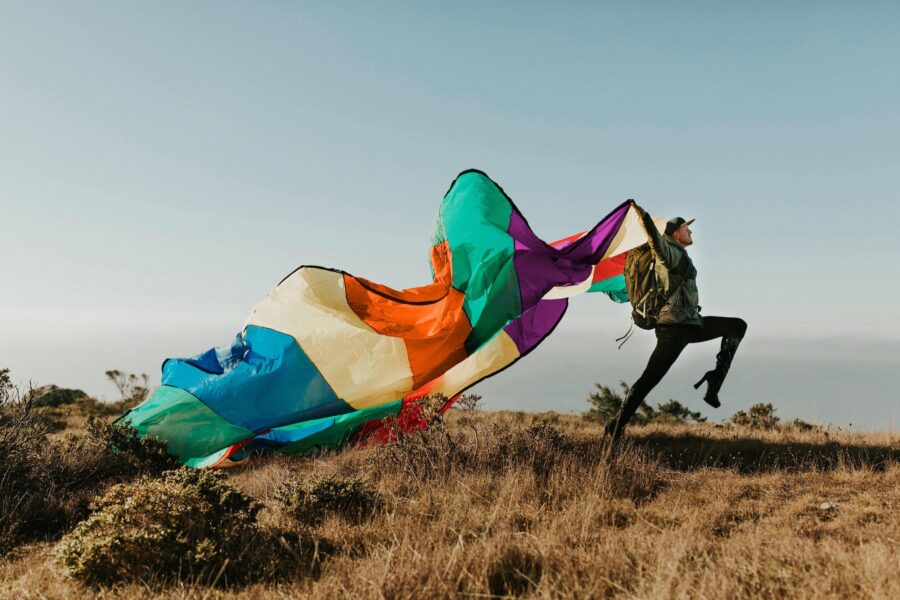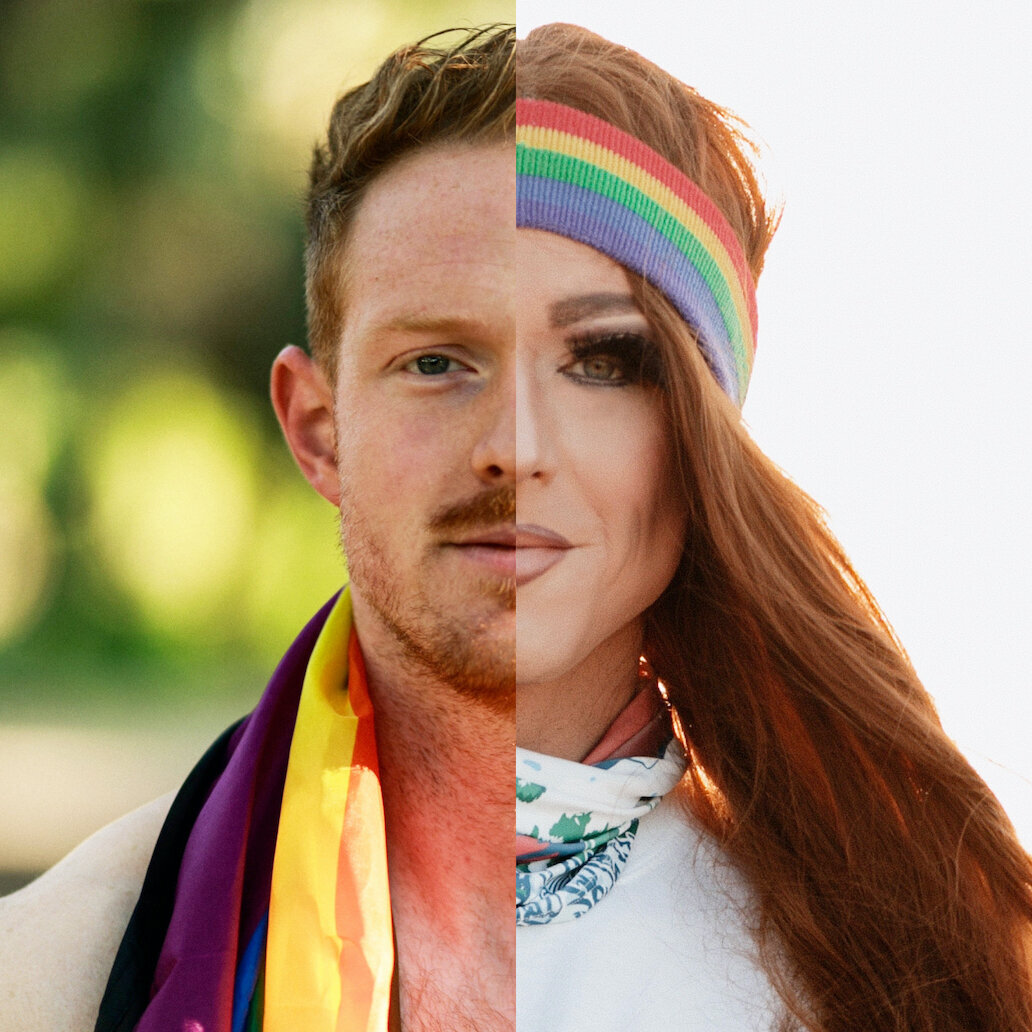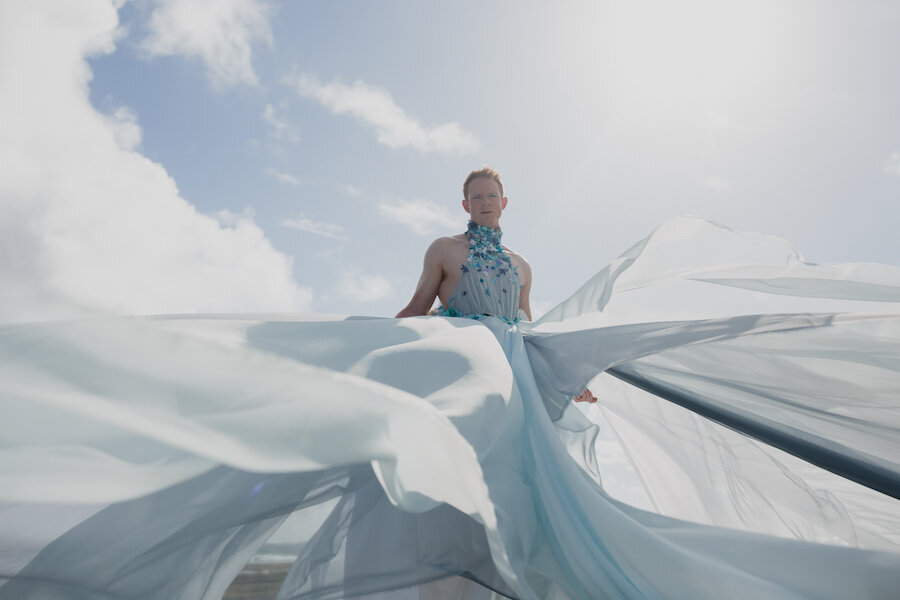
How To Advocate For LGBTQIA+ Inclusion In Sustainability Spaces With Pattie Gonia
“The beauty of intersectional environmentalism is that it allows us as intersectional humans to weave our stories, our communities, our art and our culture into the work of protecting our environment. It mirrors what nature has always taught us—that diversity and interconnectivity are essential. We so often forget that the world isn’t separated as humans and nature, rather we are nature; and we, just like every other plant and animal, are brilliantly able to make a positive impact on our planet when we choose to see ourselves not as other, but rather a part of it all.” — Wyn Wiley (aka Pattie Gonia)
Wyn Wiley (he/him) is the photographer and creative behind Pattie Gonia (she/her)—one of my favorite Instagram accounts. I first fell in love with Pattie because of her heart-warming photos and the videos of her hiking in heels. But I became a dedicated follower when I noticed the platform being used to advocate for social justice in outdoor spaces.
My conversations with Wyn have been insightful and have taught me a lot about the beauty of allowing others to take up space and to be themselves fully. It’s such a magical thing watching Pattie inspire others to not only live their truth but become anti-racist environmentalists.
Below is a snippet of our latest conversation on LGBTQIA+ advocacy and acceptance in sustainability spaces.
Can you tell me about how you became an environmentalist and such a public figure in the outdoor industry?
Much of my journey into the spotlight happened when Pattie was first born on a backpacking trip two years ago. But as much as that moment and the time since has represented a very outward and public-facing journey, the birth of Pattie also symbolizes a very personal journey in which I, for the first time in my life, lived true to my queer identity.
“I have an intersectional responsibility to the LGBTQIA+ community, other marginalized communities in the outdoors, and to our planet.”
When I started living true to who I was, my whole world changed. Yes, the internet is a powerful tool for connection and has certainly led to people knowing about my work, but every moment that has mattered most in my journey with Pattie has been when I’ve realized that I have an intersectional responsibility to the LGBTQIA+ community, other marginalized communities in the outdoors, and to our planet.
You consider yourself to be an advocate and ally in progress. why is that and what can others learn from this?
“Ally-in-progress and advocate are both terms that…serve as a reminder of progress over perfection.”
Ally-in-progress and advocate are both terms that, to me, feel like they approach the work from the space of life-long learning. They feel lighter and less like titles. They focus more on being in a state of growth. They feel true to where I’m at and serve as a reminder of progress over perfection.
You’ve been very active on Instagram about the Black Lives Matter movement and what people can do to support. What made you decide to take a stand?
I think it’s important for all of us, especially white people, to take action as allies-in-progress. In the context of the outdoors specifically, we as outdoorists have a responsibility not just to our planet, but to our fellow outdoorists to stand up and be advocates for marginalized people.
“We as outdoorists have a responsibility…to stand up and be advocates for marginalized people.”
Are there any particular organizations or activists you suggest people support?
I’ve been inspired to take action through my relationships with outdoor leaders I look up to. For example, Teresa Baker has taught me so much about what it looks like to be in solidarity with other marginalized groups other than your own.
I cannot recommend enough that people follow and support the work of The Outdoor Journal Tour, Black Outside Inc, Camp Founder Girls, Outdoor Afro, Greening Youth, and Soul Trak Outdoors. [They] are all doing such important work.
I also recommend following along with Black advocates and activists like Baker: Leah Thomas, Latasha Dunston, Alexis Martin, Tyrhee Moore, Chelsea Murphy, and Alison Desir.
I often speak about how the outdoors has been such a healing place for me as a Black woman to process trauma associated with my identity. Have you had a similar experience? If so, could you expand on what the outdoor industry could do better to be more supportive of the LGBTQIA+ community?
Absolutely. The outdoors, and especially queer community in the outdoors, has been so important to my mental health. I think the outdoors industry needs to take what they do so well to support outdoor athletes and apply that to outdoor advocates, allies, activists, and community leaders. This support needs to exist year long and needs to be mirrored internally inside the brand.
“We are the backbone of the outdoors, and we have the power and will to make change for those who need it most.”
I also think the outdoor community needs to realize that the outdoor industry is never going to be the one to solve these problems. We have to realize that we are the solution, we are the backbone of the outdoors, and we have the power and will to make change for those who need it most. Most of all, I think we’re going to have to realize that we are stronger together. Don’t hate, collaborate.
In terms of partnerships, what are examples of good and bad ways a brand can show support for the LGBTQIA+ community without tokenizing?
When a brand, organization, or individual reaches out, I look for a history of actions of authentic allyship. Specifically for me, [this means] allyship to the LGBTQIA+ community not just during Pride month, but 365 days a year. I also look to make sure the same support exists inside their company for their Queer employees. My dream partnerships are ones where we don’t focus on sales, pushing product, or commercialism, but rather partnerships that work hand-in-hand to build community in the outdoors.
Who are some of your favorite LGBTQIA+ accounts?
I’m fascinated by @queernature and their work in queer ecology. I love to follow the Black femme beauty that is @plantkween. I admire @jennybruso‘s work with unlikely hikers and [that] highlight[s] so many other queer people in the outdoors. I appreciate how trans climber Nikki Smith leads in the climbing community. I love following gay intersectional environmentalist @spencer.r.scott. And I love @queerbrownvegan, too!
RELATED READING
Leah Thomas is an intersectional environmental activist and eco-communicator. She launched the intersectional environmentalist platform to explore the relationship between environmentalism and cultural identity. You can connect with her on Instagram.


